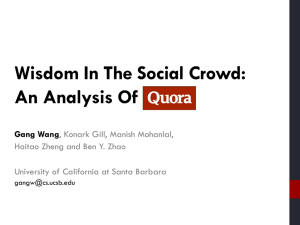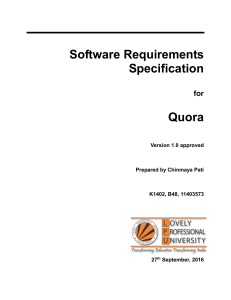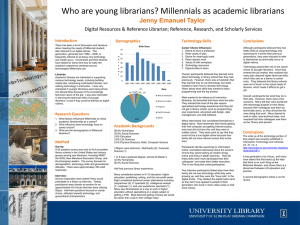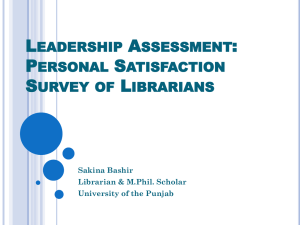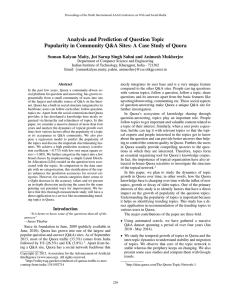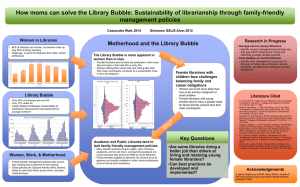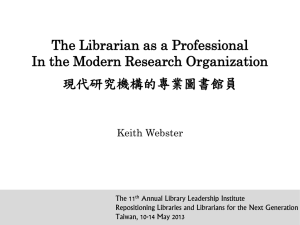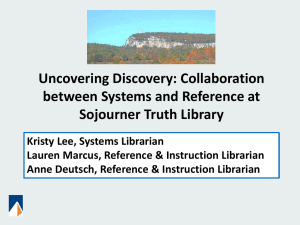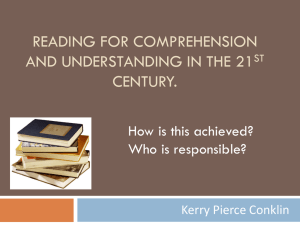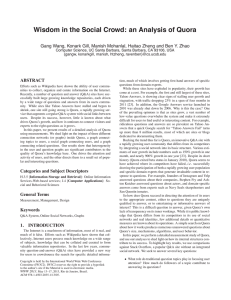powerpoint - Karen Freberg
advertisement
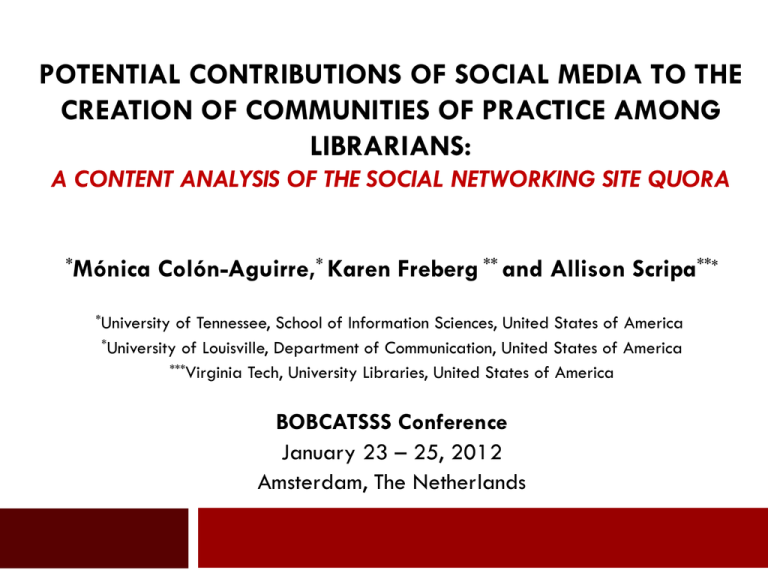
POTENTIAL CONTRIBUTIONS OF SOCIAL MEDIA TO THE CREATION OF COMMUNITIES OF PRACTICE AMONG LIBRARIANS: A CONTENT ANALYSIS OF THE SOCIAL NETWORKING SITE QUORA *Mónica Colón-Aguirre,* Karen Freberg ** and Allison Scripa*** *University of Tennessee, School of Information Sciences, United States of America *University of Louisville, Department of Communication, United States of America ***Virginia Tech, University Libraries, United States of America BOBCATSSS Conference January 23 – 25, 2012 Amsterdam, The Netherlands Overview of Study One way of sharing knowledge among members of an organization is through communities of practice (CoP). This research will focus on librarians as a CoP and how social media (SM) can foster the creation of CoP among librarians. SM facilitates the creation of communities online in which individuals can collaborate and exchange ideas and information. We will be exploring the Q&A social networking site (SQA) Quora. A content analysis was conducted in an attempt to explore the content on Quora and classify the information shared in order to determine if it can support a CoP of librarians. This step will help the researchers determine future global research and professional implications. Purpose of Research The history of libraries is parallel to the history of writing and of humanity itself (Tolzmann, Hassel, Peiss, 2001). Libraries currently are bridges between people and information, places of gathering and keepers of human history. As many other organizations nowadays, libraries are not only dependent on the knowledge of their employees but also on the knowledge of outsiders can share with the employees. Online environments have greatly contributed to the process of sharing knowledge. The contributions of these technologies to sharing knowledge have certain limitations since online communications are mostly text based (Hew & Hara, 2007), but social media can contribute greatly to improving these by enhancing the user’s experience. Literature Review Knowledge Management Communities of Practice (CoP) “a group of people who share a particular practice, interest, or discipline and share information and tacit knowledge” (Hackett, 2002; p. 731). Social Media Facilitates the creation of communities online in which individuals can collaborate and exchange ideas and information regardless of their location. Defined as being “online practices that utilize technology and enable people to share content, opinions, experiences, insights, and media themselves” (Lariscy, Avery, Sweetser, & Howes, 2009; p. 1 Introduction to Quora Quora, it is a “collection of questions and answers created, edited, and organized by everyone who uses it.” (About Quora, 2011). The site combines the features of an online Q&A site and those of social media, permitting users to ask, answer and rate content while also allowing a community of members to conduct private communication if they chose to. Research Question: How is knowledge created through CoP on Quora? Method Content analysis for exploratory study Three coders reviewed the preliminary screen shots presented on Quora related to questions pertaining to librarianship that appeared at the top of the feedback page for the topic of ‘Libraries & Librarianship’ between August and October, 2011. The questions that were coded included the following: basic information (ex. key words, areas published, topic), answer providers (name, education, specialty area), question analysis (question, sub question, interactions, tone of answer, etc), social commentary (comments, votes, sharing), and knowledge quality (citation, source, fact or opinion) and type of knowledge (book, practical, and cultural). Results Results show that the type of knowledge currently shared among Quora users along the lines of practical and cultural knowledge compared to book knowledge. The complexity of the questions asked related more to a factual nature. Opinion dominated contributions to Quora questions and inquires about academic librarians and librarianship Few answers providing citations for useful resources and the questions that did provide citations relied heavily on sources such as Wikipedia, the New York Times, and Guardian; all in online format. No research articles or sources coming from organizations or institutions related to libraries were used as a resource in any of the answers for the questions on the ‘Library and Librarianship’ category Suggestions Social media has great potential to change the way CoPs interact, work and collaborate. SQAs are particularly promising on this front, however as the results of an exploratory content analysis show, most of the questions posted on the site have been answered with personal opinions without citations or rely on questionable sources of information such as Wikipedia. Formation of CoPs there needs to be a more active participation from librarians and library professionals including sharing their experiences, expertise and resources. Future studies Future studies dealing with the subject should continue to explore Quora as a CoP in sharing knowledge, since this source is new and still expanding. Couple of suggestions: A digital ethnographic study looking at conversations and emerging themes from post and users on Quora over a longer period of time could provide more details regarding the nature of SQA’s. Interviews with librarians on their current use and perception of emerging sites like Quora and what they are doing to manage their reputation as a profession and ultimate source of knowledge. Focus groups with academic library patrons on why they are using Quora to search information and forming these communities of practice. QUESTIONS OR COMMENTS? THANK YOU VERY MUCH Monica Colon-Aguirre: monica@utk.edu Karen Freberg: karen.freberg@louisville.edu Allison Scripa: ajscripa@vt.edu References About Quora. (n.d.). Retrieved September 8, 2011, from Quora: http://www.quora.com/about/ Hackett, B. (2002). Beyond knowledge management: New ways to work. In C. W. Choo, & N. Bontis, The Strategic Management of Intellectual Capital and Organizational Knowledge (pp. 725-738). Oxford: Oxford University Press. Hew, K. F., & Hara, N. (2007). Knowledge sharing in online environments: A qualitative case study. Journal of the American Society for Information Science and Technology , 58 (14), 23102324. Lariscy, R. W., Avery, E. J., Sweetser, K. D., & Howes, P. (2009). An examination of the role of online social media in journalists’ source mix. Public Relations Review, 35(3), 314-316. doi: 10.1016/j.pubrev.2009.05.008 Tolzmann, D. H., Hessel, A., & Peiss, R. (2001). The memory of mankind: The story of libraries since the dawn of history. New Castle: Oak Knoll Press.
